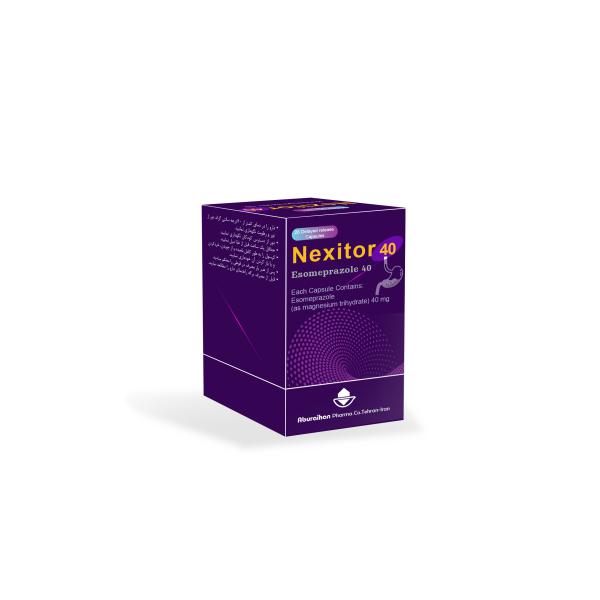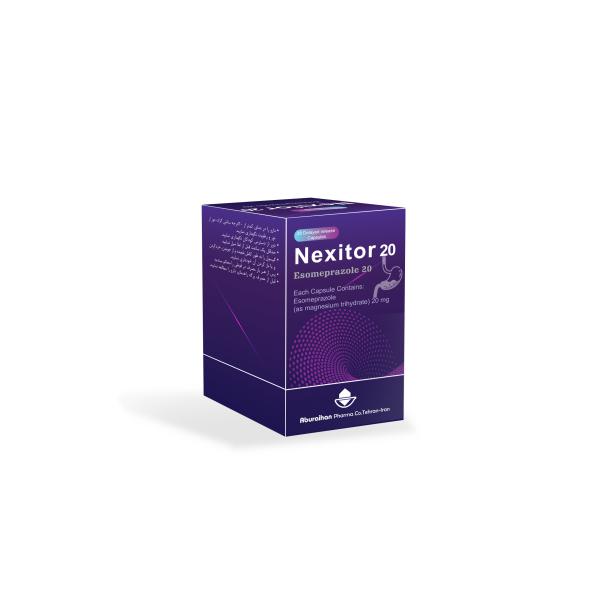Nexitor®
Esomeprazole
20 and 40 mg Capsule
Gastroesophageal reflux disease
Maintenance of healing of erosive esophagitis
Symptomatic gastroesophageal reflux disease
Helicobacter pylori eradication
Risk reduction of nonsteroidal anti-inflammatory drug-associated gastric ulcer
Prevention of gastric ulcers associated with continuous NSAID therapy in patients at risk (age ≥60
years and/or history of gastric ulcer)
Pathological hypersecretory conditions, including Zollinger-Ellison syndrome
Mechanism of Action:
Proton pump inhibitor suppresses gastric acid secretion by inhibition of the H /K -ATPase in the gastric parietal cell. Esomeprazole is the S-isomer of omeprazole.
Method of Administration:
Erosive esophagitis (healing): Initial: 20 to 40 mg once daily for 4 to 8 weeks; if incomplete healing, may continue for an additional 4 to 8 weeks; maintenance: 20 mg once daily (controlled studies did not extend beyond 6 months).
Heartburn (OTC labeling): 20 mg once daily for 14 days (maximum: 20 mg/day); treatment may be
repeated after 4 months if needed.
Helicobacter pylori eradication:
Clarithromycin triple regimen: 20 to 40 mg twice daily in combination with clarithromycin 500 mg
twice daily and either amoxicillin 1 g twice daily or metronidazole 500 mg 3 times daily; continue
regimen for 14 days.
Notes
Contraindications:
Hypersensitivity (eg, anaphylaxis, anaphylactic shock, angioedema, bronchospasm, acute tubulointerstitial nephritis, urticaria) to esomeprazole, other substituted benzimidazole proton pump inhibitors, or any component of the formulation; concomitant use with products that contain rilpivirine.
Interactions:
Ketoconazole (Systemic): Inhibitors of the Proton Pump (PPIs and PCABs) may decrease the absorption of Ketoconazole (Systemic). Ketoconazole (Systemic) may increase the serum concentration of Inhibitors of the Proton Pump (PPIs and PCABs). Management: Administer ketoconazole with an acidic beverage, such as non-diet cola, to increase gastric acidity and improve absorption if concomitant use with proton pump inhibitors or potassium-competitive acid blockers is necessary. Risk D: Consider therapy modification
Ledipasvir: Inhibitors of the Proton Pump (PPIs and PCABs) may decrease the serum concentration of Ledipasvir. Management: PPI or PCAB doses equivalent to omeprazole 20 mg or lower may be given with ledipasvir under fasted conditions. Use of ledipasvir with higher doses or with food, or 2 hours after these agents, may reduce ledipasvir bioavailability. Risk D: Consider therapy modification
Methotrexate: Inhibitors of the Proton Pump (PPIs and PCABs) may increase the serum concentration of Methotrexate. Management: Consider temporarily interrupting PPI or PCAB therapy in patients receiving high-dose methotrexate. If coadministered, monitor for increased methotrexate toxicity (eg, mucositis, myalgias) and/or delayed methotrexate elimination. Risk D: Consider therapy modification
Vitamin K Antagonists (eg, warfarin): Esomeprazole may increase the serum concentration of Vitamin K Antagonists. Risk C: Monitor therapy
Pregnancy and Lactation:
Esomeprazole crosses the placenta and is present in breast milk, use with caution.
Warning and Precaution:
- Gastric malignancy: Relief of symptoms does not preclude the presence of a gastric malignancy.
- Hepatic impairment: Patients with severe hepatic impairment may require dosage reductions.
- Renal impairment: Pharmacokinetics of esomeprazole are not expected to be altered in renal impairment; dosage adjustments are not necessary for any degree of renal impairment when using esomeprazole magnesium or esomeprazole sodium. However, since pharmacokinetics of the strontium may be reduced in mild to moderate renal impairment, esomeprazole strontium is not recommended for use in severe impairment (has not been studied).
Adverse Reactions:
Endocrine & metabolic: Altered thyroid hormone levels (increased thyroxine: ≤1%), decreased serum
potassium (≤1%), decreased serum sodium (≤1%), decreased thyroid hormones (thyroxine: ≤1%),
increased gastrin (≤1%), increased serum potassium (≤1%), increased serum sodium (≤1%),
increased thyroid stimulating hormone level (≤1%), increased uric acid (≤1%)
Hematologic & oncologic: Increased hemoglobin (≤1%), quantitative disorders of platelets (≤1%)
Hepatic: Increased serum alanine aminotransferase (infants, adults: ≤1%), increased serum alkaline
phosphatase (≤1%), increased serum aspartate aminotransferase (≤1%)
Renal: Increased serum creatinine (≤1%)
Storage:
Store below 30ºC and protect from light and moisture.


